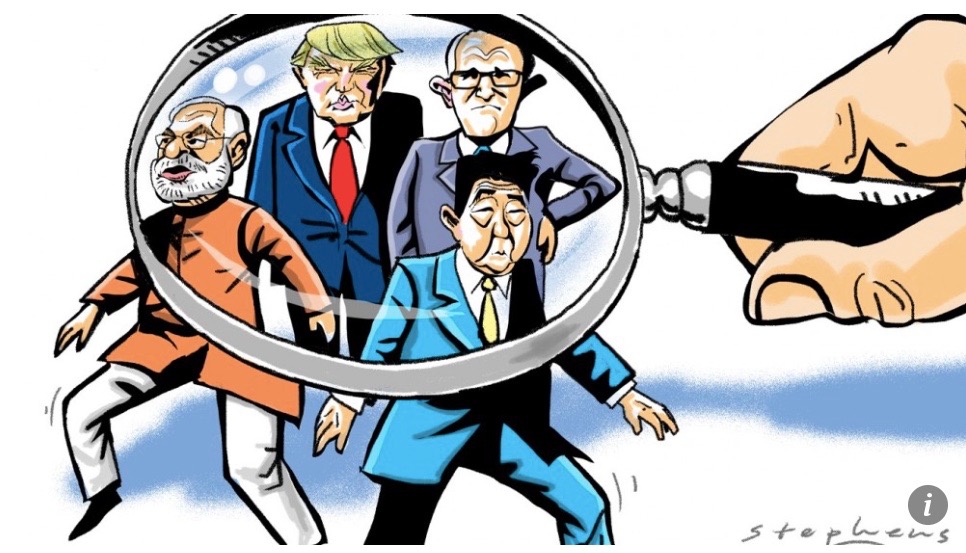Courtesy of the East West Center: From Singapore, 30 June 2018—From the Himalayas to the Korean DMZ to the South China Sea, the balance of power in Asia appears to be shifting. But beneath the rhetoric, have the fundamentals really changed? At this past week’s 2018 East-West Center International Media Conference in Singapore, an expert panel of journalists, policy analysts, and academics examined the situation from a regional perspective. (View video of the panel.) The conference was co-hosted by EWC, Konrad Adenauer Stiftung and Singapore Management University.
Satu Limaye, Director of East-West Center Washington, emphasized the continuity in American relations with Asia. The US today has more—and stronger—allies in Asia than 10 to 15 years ago, and the US military role in the region is as strong as ever, Limaye said. He addressed whether the recent summit between Kim Jong-un and Donald Trump marks a fundamental change or opportunity to improve regional security: “We’ll have to see, but it’s worth exploring.”
C. Raja Mohan, Director of the Institute of South Asian Studies at the National University of Singapore, emphasized that the recent US-North Korean summit could offer a strong opportunity for change. He criticized the media for focusing narrowly on the denuclearization issue. Rather, he said, the meeting between Trump and Kim and the positive role of South Korea’s President Moon Jae-in “have a huge potential to transform the structure of international relations in Northeast Asia, particularly by encouraging North and South Korea to find ways to reconcile their differences.” He added, “The Chinese will have to adjust to a Korean peninsula that will probably not be as tied to China as it is today, and Japan will have to come to terms with Korean nationalism.”
Addressing security concerns, Mohan emphasized that the US is still the dominant military power in the Asian region as well as the world’s biggest economy. Asian countries “do not have the option of turning their backs on the US,” he said. Instead, it’s the Americans who are asking, “Why is the US paying to defend allies that are now rich and can pay for their own defense?” He stressed that India and other Asian countries “must pitch in to assure their own security rather than relying on the Americans.”
Limaye pointed out that there are several overlapping alliances in Asia, including the “quad alliance” that includes the US, India, Japan, and Australia. These alliances do not replace the US military role in region, however, “which remains fundamentally unchanged.”
Mohan added, “If China puts pressure on its neighbors, other countries in the region will have to rely more on the US and on each other.” But at present, he said, the Chinese seem to be adopting a less aggressive stance.
Trade and investment are other important issues. “India needs to figure out a way to respond to a tougher US stance on trade without increasing friction with China,” according to Mohan. For all the talk of trade confrontation between the US and China, there is still intense negotiation, and India needs to be prepared to play a positive role.
Zakir Hussain, Foreign Editor of The Straits Times in Singapore, pointed out that China is the largest trading partner for every member of the Association of Southeast Asian Nations (ASEAN), and the Chinese are an increasingly important source of revenue from tourism. “No ASEAN country wants to be forced to choose between the US and China,” he said. Rather, all countries in the region, including India, Japan, and Australia, need to come together to create a slightly different regional order and to send a signal that “trade wars should have no place in this region.”
The panel moderator, Bloomberg View Editorial Writer on Asia Nisid Hajari, pointed out that China is trying to expand its influence in Southeast and South Asia through Belt and Road investments in infrastructure. He commented that these investments are provoking an increase in “natural suspicion, in Malaysia in particular, or a kind of backlash.”
Wu Minsu, Vice Dean at the Communication University of Beijing, commented that many people outside China might not fully comprehend the Chinese government’s intentions and activities because they get all their information from foreign media. The Chinese government, she said, is currently expanding media outreach to global audiences.
Hussain commented on China’s Belt and Road initiative from a Southeast Asian perspective. “Southeast Asian countries need infrastructure investments, and Chinese state-owned companies have the scale and experience to carry out large projects,” he said. “But if these projects are to be sustainable as local regimes change, it is very important that they involve and engage local communities.”
Mohan added that the problem with China’s Belt and Road projects lies not in infrastructure investment itself but in the terms of Chinese engagement—high interest rates and the danger that countries will fall into a debt trap. “But instead of criticizing the Chinese, there needs to be more multilateral efforts to modernize infrastructure,” he said. “Countries such as India, Japan, and the US need to offer an alternative to Chinese investment.”
Limaye added that despite the rhetoric surrounding the Belt and Road initiative, there has actually been much more Japanese infrastructure investment in the region than Chinese. Countries need to “create economic incentives to attract companies for infrastructure investment, and they need to insist on terms that will limit indebtedness, impose appropriate environmental standards, and counter corruption,” he said.
##
The EAST-WEST CENTER promotes better relations and understanding among the people and nations of the United States, Asia, and the Pacific through cooperative study, research, and dialogue. Established by the U.S. Congress in 1960, the Center serves as a resource for information and analysis on critical issues of common concern, bringing people together to exchange views, build expertise, and develop policy options.

